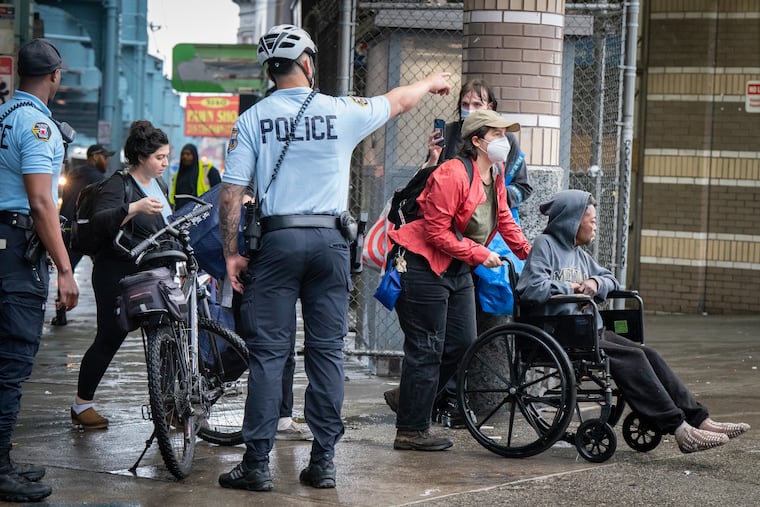Mayor Parker’s Kensington plan shows promise, but more details and transparency are needed | Editorial
The mayor has made good on her promise to address the quality-of-life issues that have long plagued the neighborhood. But greater openness about spending and other initiatives is essential.

Five months into her administration, Mayor Cherelle L. Parker began making good on her promise to shut down the open-air drug market in Kensington.
Philadelphia police and city workers dismantled a homeless encampment last week along a two-block stretch in Kensington. The rollout has not been perfect, but the attention and attempt to improve the quality of life in the long-troubled neighborhood is welcome. Indeed, nearly 60 people in and around the encampment accepted treatment, care, or housing services last week, a spokesman for Parker told the Editorial Board.
Whether the efforts can continue to be handled with dignity and sustained long enough to make a lasting impact remains to be seen. But we give Parker props for taking on an intractable problem, decades in the making.
For too long city officials looked the other way as crime, gun violence, open-air drug dealing, rampant drug usage, prostitution, and homeless encampments overwhelmed Kensington, which has a poverty rate of 45%.
Past efforts to crack down on drug dealing and homelessness were short-lived and shortsighted. Over time, Philadelphia allowed a humanitarian crisis to unfold in plain view.
More than one-third of the city’s unhoused population live in Kensington. There were 1,270 fatal overdoses in its main zip code — 19134 — between 2015 and 2022; that figure is more than double any other neighborhood. There were more than 1,400 shootings in Kensington during that same time.
Kensington became known as the Walmart of heroin. Viral videos of homeless encampments and scores of people in the throes of addiction were heartbreaking. Residents were traumatized, and quality of life was degraded beyond any acceptable standard for a city that claims to be world-class.
Parker has become a champion for the residents in Kensington. Immediately after taking office, she declared a public safety emergency in Philadelphia and went to Kensington to swear in Police Commissioner Kevin Bethel.
Parker then gave Bethel 100 days to develop a comprehensive plan to address public safety across the city, including the open-air drug market in Kensington. Last month, Parker signed three bills into law that aimed to tackle quality-of-life issues in Kensington. On her 100th day in office, Parker toured the neighborhood.
Community activist Darlene Burton said Parker has been to Kensington often to update residents on her plan. “I think that she is really trying to make a difference here,” Burton told the Editorial Board.
Not everything has gone smoothly. Last fall, Parker floated a plan to call in the National Guard to help shut down the open-air drug market in Kensington but backed off after Gov. Josh Shapiro rejected it.
Public health officials and others said Parker’s plan to cut funding to a nonprofit that provides clean needles to drug users will lead to an increase in the spread of HIV and hepatitis C.
City Council criticized the Parker administration for the lack of transparency regarding its plans in Kensington, which include borrowing $100 million for “triage and wellness facilities” for people in addiction.
Parker acknowledged the efforts in Kensington won’t be perfect, and likened the initiative to “building the plane while I’m flying it.” That is an alarming admission and a risky approach.
Then again, Parker frequently dismisses input from experts whom she often refers to as “academicians” and “I-know-what’s-best-for-you-people policymaking.” But listening to trained pilots may make for a safer flight. Better communication, transparency, teamwork, and community input will certainly reduce the turbulence.
To that end, Parker must spell out the plans in Kensington, including any borrowing, spending, and contracting. Council is right to take a trust-but-verify approach. Taxpayers should know where their money is going.
For now, community leaders in Kensington seem to support the spirit of Parker’s plan, even if they have mixed opinions about its prospects for success. But the optimism includes healthy skepticism. Past plans in Kensington have come and gone with only short-term or limited impact. Past mayors have lost interest after the initial show, or worse, ignored the problem.
To be sure, there is no quick fix. Closing encampments is a good start, but the hard work of dismantling the network of drug dealers should also be a top priority.
There are roughly 80 open-air drug markets within a 1.9-mile stretch of Kensington, with different gangs on some corners selling four or five different drugs, Bethel told the Editorial Board.
It adds up to a $1 billion-a-year business that employs thousands of big and small dealers. Philadelphia police have begun chipping away at the drug trade. Since mid-March, 159 drug sellers and 67 buyers have been arrested, Bethel said.
The police department is working with federal and state law enforcement to develop a strategy that will target violent crimes and drug abuse and bring in intervention and treatment services, Bethel said.
Bethel acknowledged that shutting down homeless encampments and disrupting drug sales may cause users and dealers to move to other neighborhoods. He said the city will remain “nimble and humble” in its efforts and adjust its tactics as needed.
Unlike past efforts, Bethel said the city is in it for the long haul. “The mayor made a commitment to the community,” he said.
Time will tell if real change comes to Kensington.